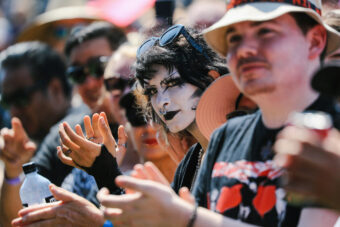Hordes of young people gather in the middle of nowhere, raising devil horns and pumping ?sts along to a rock-radio staple. Laser lights penetrate the deep night sky and catch dust particles launched by the stomping of boots on desert ground. But these are not Doc Martens in the Coachella mosh pit; they’re the combat boots of 5,000 men and women who are mostly wrapped in the sandstone camou?age of the U.S. Army, and strapped with M16 ri?es.
On this March evening, MySpace, Armed Forces Entertainment (AFE), and the Department of Defense have transformed Camp Buehring, a military base in Kuwait 15 miles south of the Iraqi border, into a giant concert venue. Featuring sets from Filter, Disturbed, the Pussycat Dolls, Jessica Simpson, and comedian Carlos Mencia, Operation MySpace is meant to offer a much-needed night of mindless diversion to the troops, the majority of whom have just arrived in the Middle East for active duty in Iraq, and is being simulcast via its namesake website to an estimated three million viewers worldwide.
“When the troops kept thanking me, I was like, ‘Stop! I am here to thank you,’ ” says Filter frontman Richard Patrick. “I really felt like I was doing a service.” But when it comes to getting the soldiers’ minds off combat for a little while, Operation MySpace is hardly the norm.
But when it comes to getting the soldiers’ minds off combat for a little while, Operation MySpace is hardly the norm. Gone are the days of the star-studded USO (United Service Organizations) tours, where the likes of Bob Hope and Marilyn Monroe would perform at U.S. military bases worldwide — since Vietnam, the USO has diverted more resources to services such as mental health care for active soldiers. And booking acts is complicated by the fact that AFE and the USO are at the mercy of the Department of Defense. “DOD has to of?cially accept the offer, because entertainment is not the primary mission of the military,” says the USO’s Rachel Tischler. “We need the military a big boost. “There are groups that to move us around and provide go out and they come back and tell security and all that good stuff.”
Money, of course, is just as big a factor. The backing of a major company helped Operation MySpace book big-ticket talent, but this is the exception to the rule. For its part, AFE prefers to spend its congressionally appropriated $6.5 million annual budget — which has to cover the bands’ travel (usually on commercial flights into the Middle East, then via military transport once they’ve arrived), rented gear, and a small per diem — on lesser-known acts, thereby increasing the frequency of shows. The USO pays only a $50 to $150 per diem — yes, even for Jessica Simpson — and also covers only the production costs, travel expenses, and hotel stays for its performers.
But can a band make a living from military touring?
Unheralded Atlanta-based alt rockers Five Star Iris met with reps from Navy Entertainment and AFE at the RedGorilla music festival in Austin, Texas, in 2007 instead of label honchos and booking agents. The resulting tour took them to bases throughout Southwest Asia on military planes and helicopters, and they now earn what they call a “nice lump sum” on this circuit. Although it does present challenges that your average van tour through college towns doesn’t.
“All of a sudden, you’re flying over a town and cannot help but think, ‘There’s got to be at least one person that would take us out if they could,’ ” says Five Star Iris frontman Alan Schaefer, recalling a night flight over the Iraqi desert. “Out of nowhere, two soldiers in the helicopter, at the same time, lock the weapons. And I’m thinking, ‘Holy shit!’ ” For these guys, though, it’s worth the risk. “What’s achievable is us being a sustainable business,” says Schaefer, whose band is headed to Japan later this year on another military jaunt. “We’ve seen big spikes in our iTunes downloads, and I really think a big part of that has to do with the military. On these tours, we don’t [and aren’t allowed to] sell CDs, so the only way for people to get them is to buy them online.”
The organizations involved would be glad to offer more recognizable talent to American troops abroad, but they have to make do with what’s available. At the same time, as Navy Entertainment’s Karen Fritz says, “If [the troops] don’t recognize the music, they might not come see the show.” For AFE and USO, word of mouth among bands can provide a big boost. “There are groups that go out and they come back and tell their famous friends,” says the USO’s Tischler. “We’d love more partnering with industry, more people knowing who we are,” says Col. Ed Shock of AFE.
With the war’s unpopularity at home, some bands might worry about adverse reactions from their fans. For Filter, that wasn’t the case. “[The reaction] was 99.9 percent positive,” says Marc Pollack, the band’s manager. “You have a couple of people who voice their opinion — like, ‘Why would you do this for Bush?’ — not understanding the real reasons why we did this.”
“I would absolutely recommend it to other bands,” says Richard Patrick. “Someone is out there, literally doing the hard work, and it reminds you, you’re American, buddy, and you get to be in a fucking rock band. How sweet is your life?”
Operation MySpace video blogs:
— Pre-travel thoughts
— Arrival in Kuwait
— The troops jam with Filter’s Richard Patrick
— Lu Huynh rocks Stone Temple Pilots’ “Interstate Love Song” with Filter’s Richard Patrick
— Interview with Richard Patrick and Filter’s former bassist, Sgt. Frank Cavanagh | Part One | Part Two | Part Three





